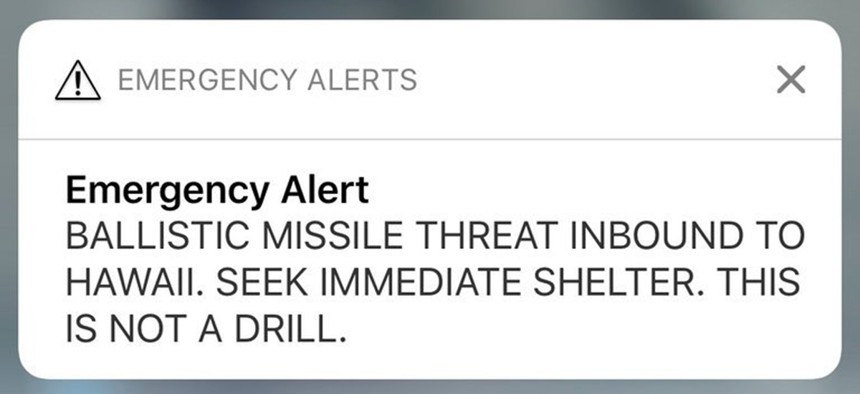After Hawaii False Alarm, Lawmakers Want President, Pentagon Involved in Missile Alerts

Wikimedia Commons
It should take more than a single employee to send such an alert.
Lawmakers are exploring ways to increase safeguards on an emergency alert system that allowed a single government employee to accidentally send a ballistic missile warning to the state of Hawaii.
The Senate Commerce Committee on Thursday grilled telecommunications industry leaders and regulators about the process for sending emergency alerts and how to best improve the system to rebuild Americans’ trust.
“False alerts not only create unnecessary panic, they undermine the integrity of the emergency alert system, leading to public distrust and confusion,” said Chairman John Thune, R-S.D., in his opening statement. “What happened in Hawaii is inexcusable and must be addressed to ensure an incident like that never happens again.”
On Jan. 13, the people of Hawaii received a text message from the Hawaii Emergency Management Agency warning them to seek shelter from an incoming ballistic missile. The agency intended the message to be part of an internal test of its emergency missile warning system, but an unnamed employee sent it to the public by mistake.
“This is not a drill,” the message read.
There was indeed no missile headed for the islands, and though HEMA recognized the error within minutes, it took an additional half an hour for them to issue a public correction, according to Sen. Brian Schatz, D-Hawaii. Not only did the mishap put people through one of “the most harrowing hours of their lives,” he said, but it also raised questions about who should have the authority to send messages that could potentially instigate a nuclear war.
Thune and other lawmakers expressed similar disbelief that such a dire alert could be issued without direct involvement from the uppermost levels of government. They said warnings of this magnitude should fall under the authority of the president or relevant national security agencies like the Defense and Homeland Security departments.
As part of its investigation into the incident, the Federal Communications Commission is looking into how a single government employee could trigger an alert, said the agency’s Public Safety and Homeland Security Bureau Chief Lisa Fowlkes.
She told lawmakers the employee who mistakenly sent the warning isn’t cooperating with investigators, but HEMA has already amended its rules to require two individuals sign off before sending test or live alerts. The agency is also working with contractors to put more technical safeguards in place for its alert system, she said.
FCC doesn’t have authority to screen the legitimacy of alerts, but the agency oversees the Wireless Emergency Alert system and Emergency Alert System that are used to distribute messages across cell phones, TV and radio. Though it can’t mandate additional safeguards, the agency is voting next Tuesday on a provision that would require broadcasters to target alerts within one-tenth of a mile of the affected region, according to Fowlkes.
Lawmakers largely supported the measure, which they said would help ensure people receive only relevant warnings while cutting down on “alert fatigue” caused by a constant stream of system tests. They asked FCC to look into the types of systems that are in place to ensure top officials have reliable lines of communication during an emergency incident when commercial lines are overwhelmed.
Conspicuously absent from the hearing were representatives from the Federal Emergency Management Agency, which is responsible for clearing alerts from by state, local and federal officials before they’re sent to the public. Though the committee invited FEMA to testify before the panel, the agency declined to participate, Thune said.
Thune said the committee will hold a second field hearing on this topic in Hawaii and expects FEMA and other relevant authorities to participate, though an exact date hasn’t been scheduled. He told reporters he’s open to legislating more safeguards into the emergency alert process if deemed necessary, and a future bill would likely be attached to the upcoming Homeland Security authorization bill.



